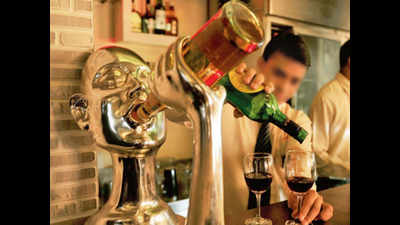- News
- City News
- mumbai News
- Less than 30% manage to overcome their liquor addiction: Govt data
Trending
This story is from July 20, 2018
Less than 30% manage to overcome their liquor addiction: Govt data

Representative image
MUMBAI: In the last three years, barely 22 to 28% of the people who were addicted to alcohol in Maharashtra and subsequently underwent counselling have given up liquor, say figures obtained from the state’s de-addiction board.
The state’s de-addiction board (nashabandi mandal) has five full-time crusaders against addiction, 35 coordinators and 500 volunteers who participate in counselling drives conducted through de-addiction centres and doctors across the state and collect the data.

Figures from the last three years (see box), show that a huge portion of people (over 70%) who underwent counselling against their addiction could not beat it.
Dr Hemant Thacker, consultant specialist for Jaslok, Bhatia and Breach Candy hospitals, said lack of awareness among relatives and friends was a hurdle. “One needs to increase awareness among relatives and friends of the afflicted, as such patients need special rehabilitation. It’s high time society develops dedicated rehab homes and centres to treat such patients. The major impediment to creating such centres is poor financing. Unless we have quality rehab, we can’t increase the success of such drives,” he said, and called for more social participation in such treatments.
The state’s de-addiction board (nashabandi mandal) has five full-time crusaders against addiction, 35 coordinators and 500 volunteers who participate in counselling drives conducted through de-addiction centres and doctors across the state and collect the data.

Figures from the last three years (see box), show that a huge portion of people (over 70%) who underwent counselling against their addiction could not beat it.
Doctors suggest a multipronged strategy to control the addiction of patients, and not just counselling or medicinal treatment. According to Dr Shubhangi Parkar, head of psychiatry and chief of the deaddiction centre at the civicrun KEM Hospital, the craving for liquor is more biological and there are medicines which work effectively against it. “Of course, it’s a psychiatric disorder too which needs to be treated through psychosocial methods by taking support from family and friends. So a more comprehensive approach is needed while treating a patient. We observe de-addiction for two years and then decide on the patient’s recovery,” she added.
Dr Hemant Thacker, consultant specialist for Jaslok, Bhatia and Breach Candy hospitals, said lack of awareness among relatives and friends was a hurdle. “One needs to increase awareness among relatives and friends of the afflicted, as such patients need special rehabilitation. It’s high time society develops dedicated rehab homes and centres to treat such patients. The major impediment to creating such centres is poor financing. Unless we have quality rehab, we can’t increase the success of such drives,” he said, and called for more social participation in such treatments.
End of Article
FOLLOW US ON SOCIAL MEDIA










